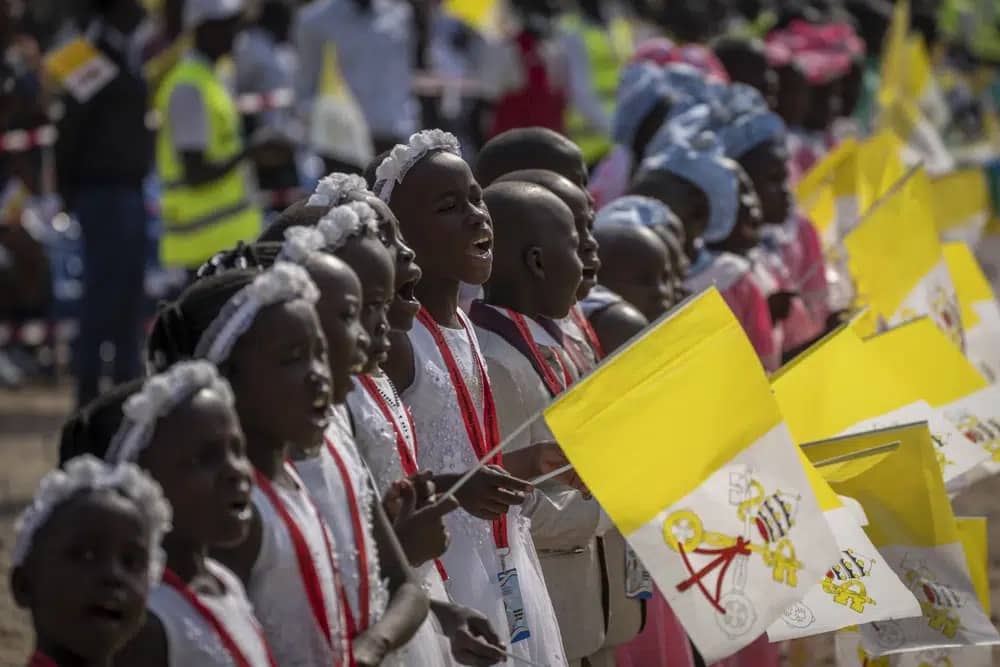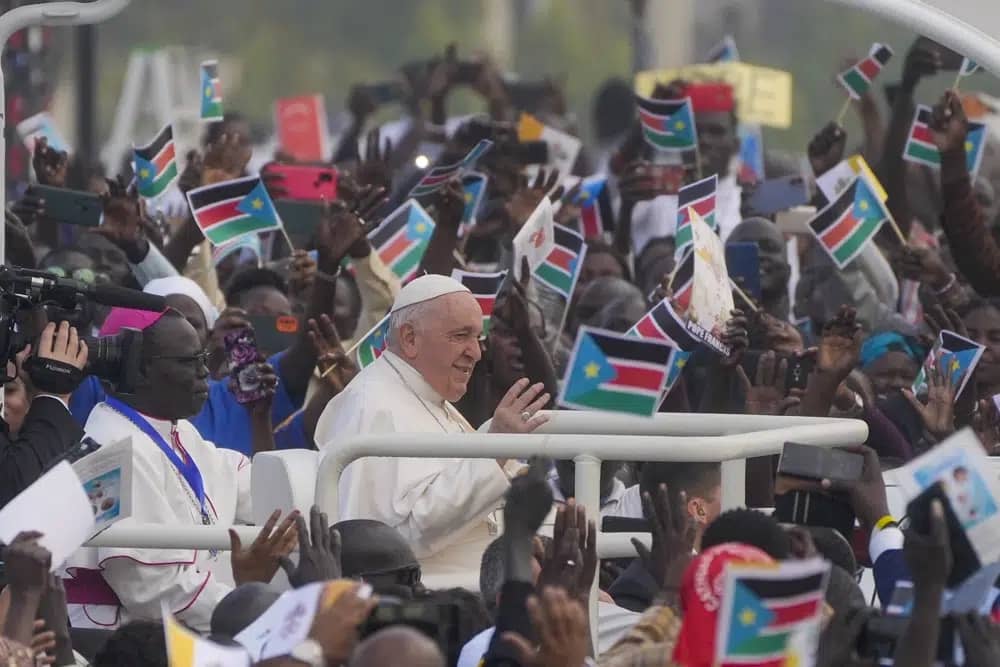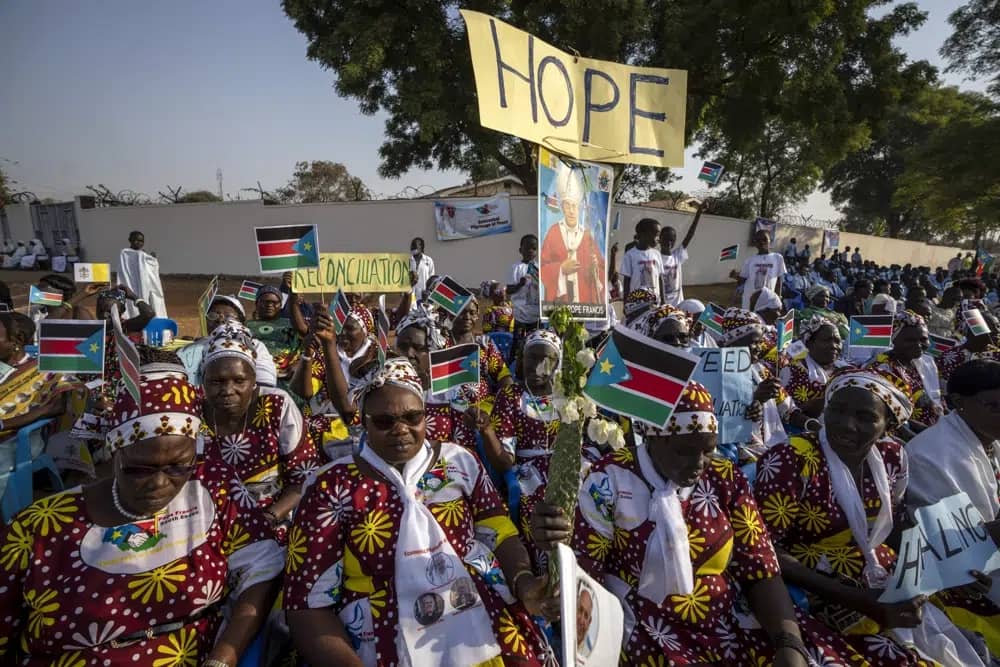ROME – In the wake of Pope Francis’s visit to Africa last week, people in both the Democratic Republic of Congo and South Sudan seemed optimistic that the pontiff’s words and deeds made a real difference in inspiring change, even if perceiving the concrete results will take time.
Speaking to Crux, Eduardo Burgueño, a family doctor who has been working in the DRC capital of Kinshasa for 15 years, alluded to the mass poverty and the bleak conditions facing many of his patients, including some who come from the conflict-ridden east, and the corruption that enables it to continue, saying the pope’s words shed light on a forgotten problem.
Pope Francis’s willingness “to speak, strongly, on the real and main problems of these people, is like intravenous epinephrine for a patient in anaphylaxis,” the doctor said, referring to the use of adrenaline to jolt someone out of a severe and life-threatening allergy.
“Definitely yes, his words have made a difference. There is no way to push back. Every social actor in DRC is highly sensibilized from now on,” Burgueño said.
Likewise, Stephen Ameyu Martin Mulla, the Archbishop of Juba in South Sudan, told Crux that the pope’s visit alongside two other Christian leaders – Archbishop Justin Welby of Canterbury, and Iain Greenshields, moderator of the Church of Scotland – was a much-needed follow-up to a 2019 retreat with the country’s leaders at the Vatican, in which Pope Francis bent and kissed their feet, asking them to make peace.
“We believe that their visit will really strengthen the building of peace in South Sudan. Not only that, but also to bring people closer to build bridges,” Mulla said, saying the people “have been estranged by war, estranged by conflict, by tribalism, and many, many other things.”
“I believe that at the end of the day, we will always reach this level where people can agree on how the country can move. These church leaders will help us always to do that,” he said, saying the papal visit was instrumental in setting the stage for this to happen.
A clear message
Pope Francis visited the DRC and South Sudan Jan. 31-Feb. 5 in a bid to bring comfort and encouragement to the two war-torn nations, and to call the leaders of each nation to task.
The DRC, after a lengthy history of violent exploitation by colonialist settlers, has been in the throes of a cyclical internal war that has been raging for over 30 years, concentrated mainly in the country’s eastern regions, and which has left millions dead and displaced and has caused tension with neighboring countries.
The Congolese army is engaged in clashes with over 120 rebel groups, the most prominent of which is the M23 group, but it has made little progress in bringing the violence to an end, a fact Pope Francis blamed on the corruption of both Congolese leaders and foreign interests who are taking advantage of the war for their own profits.
South Sudan, for its part, has been torn by civil war since 2013, just two years after its independence in 2011, with its leaders unable to overcome tribal and power-sharing disputes. Numerous ceasefire agreements have fallen apart, and while a 2018 deal which the Vatican helped broker has largely held, its implementation has repeatedly been delayed, and violence continues to plague much of the country due to ethnic and tribal tensions, and easy access to weapons.
In the DRC, the pope kicked off his trip with a harsh condemnation of the violent colonialist history of the country and the greedy exploitation of Africa’s resources by wealthy global elites.
He celebrated Mass for the country’s 52-million strong Catholic population, according to Vatican estimates, and made headlines for meeting with a group of war victims from eastern DRC, hearing their stories of horror and embracing women who had been serially raped and those who had been mutilated by rebels during violent attacks on their villages.
He also held meetings with the country’s bishops, priests, and religious, and with members of charities who assist war victims and those displaced by the country’s enduring conflict, offering encouragement and telling them to bring God’s comfort to the people.
In South Sudan, the pope gave a similarly blunt opening act, telling the country’s authorities in his opening speech that he was disappointed by their failure to fully implement the 2018 peace agreement, and to thus fully end conflict on the ground.
He decried the “constant collapses” in the peace process and said that now was the time to get serious, “without ‘ifs’ or ‘buts.’”
Pope Francis also comforted the suffering people of South Sudan in a meeting with a handful of the country’s roughly two million internally displaced people, many of whom have been living in camps for years and have been displaced multiple times.
He joined Welby and Greenshields in condemning tribalist instincts and stressing the importance of forgiveness and Christian unity in the national reconciliation process, saying the ties between different Christian communities is a remedy to the divisions that often tear them apart.
Hope for real change
In his comments to Crux, Mulla noted that many people are now losing faith in South Sudan’s political leadership to effectively achieve peace, but insisted that “we need to at least give them a chance,” and said, “We should not be too prejudiced by what has happened.”
God is patient, he said, so “we give them the chance to implement peace and to bring peace to their own people. I believe that is the stand of the Holy Father. The Holy Father would like to convince the leaders of this country that it is time for peace, and people need to build themselves.”
Mulla voiced his belief that if the country’s leaders take the pope’s message to heart “and begin to change, the whole country within a short time will be strong and will also be an example for other countries.”
“The trip will make a great difference. Why? Because our people here in South Sudan, they listen, and they would like to see church leaders. They listen to the church leaders on their message about peace and about reconciliation,” he said, saying he believes the people will now “really begin to assume the way to reconciliation.”
Likewise, Reverend James Makuei Choul, Moderator of the Presbyterian Church of South Sudan, also voiced confidence in the visit of Welby, Greenshields, and the pope, saying it sent an important message about unity.
“Different denominations came together to lament about our situation so that we achieve peace,” he said, calling the visit an answer to their prayers.
“Our hope is raised by the visit of our international brothers,” he said. Choul lamented the delay in the peace process, saying the people hope that in the wake of the papal visit, “our political leaders will have a political will to implement this peace in letter and in spirit.”
“They will, because there is no option except to implement this peace, otherwise South Sudan will not be the same,” he said, saying the visit will undoubtedly make a different, “because the government has been preparing the ground together with the church leaders, so they are committed.”
Speaking to Crux, Congolese priest Father Paulin Sabuy said the pope’s vocal condemnations of corruption and exploitation in Africa were important, but “it is difficult to say” what the long-term impact of his advocacy will be.
“We must wait and see with the passage of time. But there is still hope,” he said, praising the pope’s condemnation of the “forgotten genocide” in eastern DRC and his appeal for “hands to be taken off the DRC” in his opening speech.
Sabuy said the most moving moment of the pope’s visit was his meeting with war victims in the east, and that “The degree of cruelty that has been achieved in order to terrorize and control parts of the territory for the illegal exploitation of wealth is unspeakable.”
Noting that this meeting got lots of attention in the international press, he voiced hope that “by lifting the veil on these horrors, the pope will have contributed to bringing those responsible out of indifference.”
Burgueño said the pope’s message to politicians and international actors on corruption and exploitation within the DRC and the rest of Africa had a resounding affect, because people “don’t trust politicians. Me neither.”
People of goodwill in positions of leadership “don’t abound,” he said, noting that the DRC is set to hold national elections at the end of the year, and a good relationship between the people and their leaders is key to moving forward.
The people, Burgueño said, don’t hold on to anger, but rather “want to grow, to construct their lives.”
To this end, he begged those with public authority, “don’t work to take advantage of your brothers and sisters.” Exploitation is a problem, he said, and condemned those within the DRC and in surrounding countries who take advantage of the conflict to line their own pockets.
“Brother and sister, take your responsibility in front of your community and God, don’t be complicit in these matters, please,” he said, saying, “you kill our children, our women, our elders when you turn away the money and resources you are administering.”
Burgueño said the problem of exploitation and corruption has two main levels in the DRC, the first of which is the conflict in the east, and the second is the presence of corruption at the level of public administration.
He praised steps being made to combat corruption by the country’s central public administration, but said the problem is “generational” and will take time to overcome.
Whether or not the trip and Pope Francis’s appeals will make a difference in this regard, “depends on how seriously the Catholic Church is taking this papal visit,” he said.
“The credibility of the church is crucial for this impact. Not due to its political views and power decisions, but because of coherence,” he said, saying that if laypeople, priests, religious, and bishops are coherent in their own lives, “the Democratic Republic of Congo will radiate peace in all Central Africa.”
“The pope has confirmed us in hope, service and joy. He has been sent by God to us. We are not naive. We trust in Him,” Burgueño said.
Follow Elise Ann Allen on Twitter: @eliseannallen















